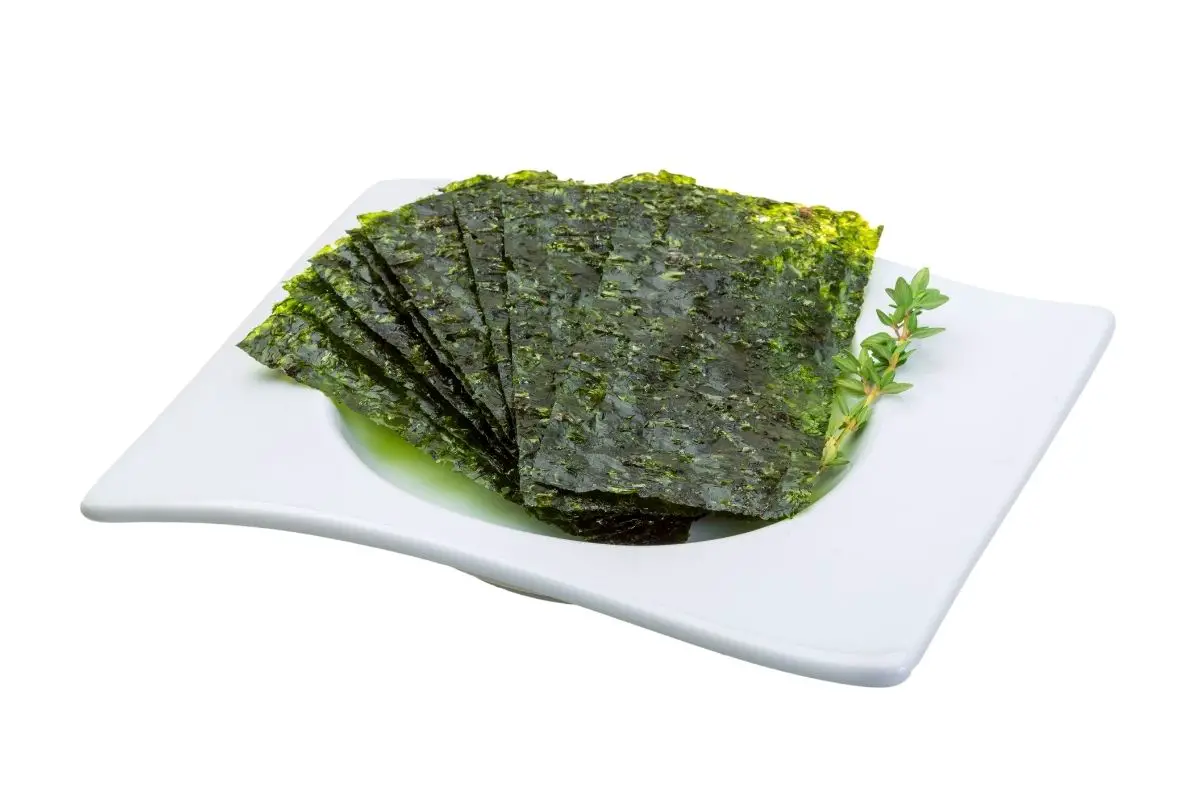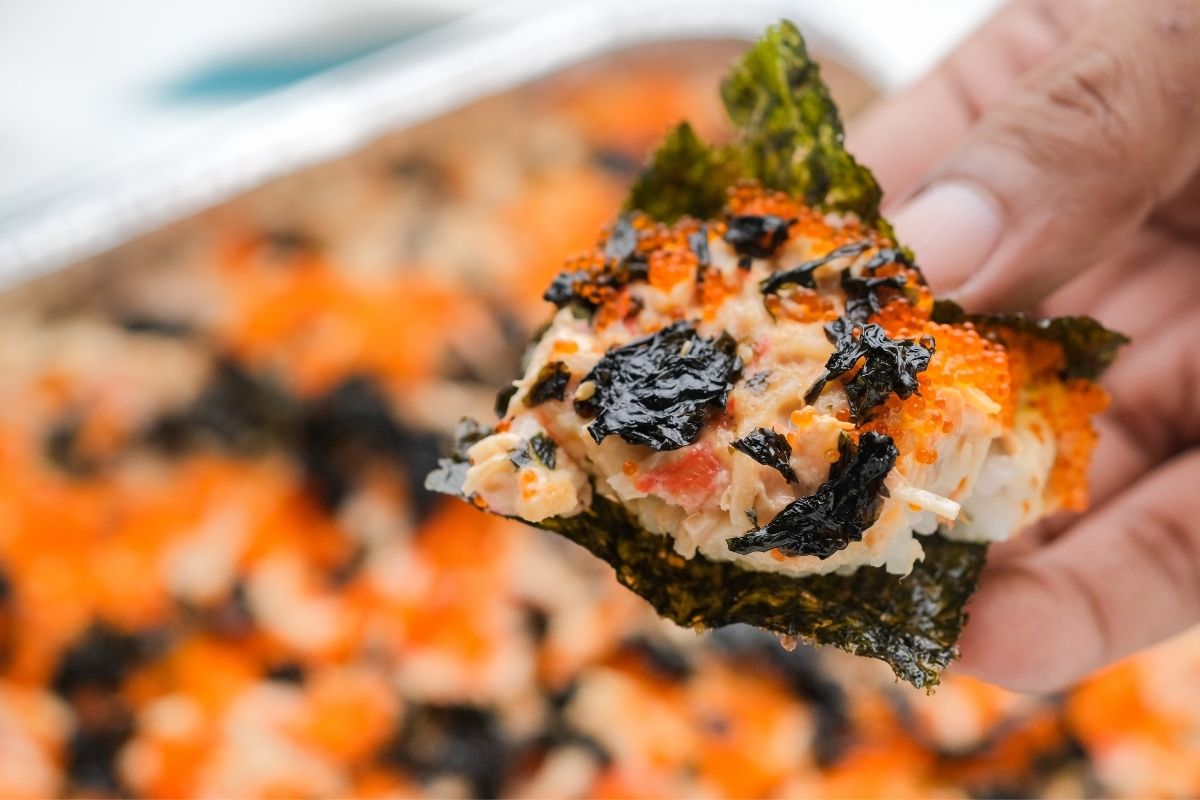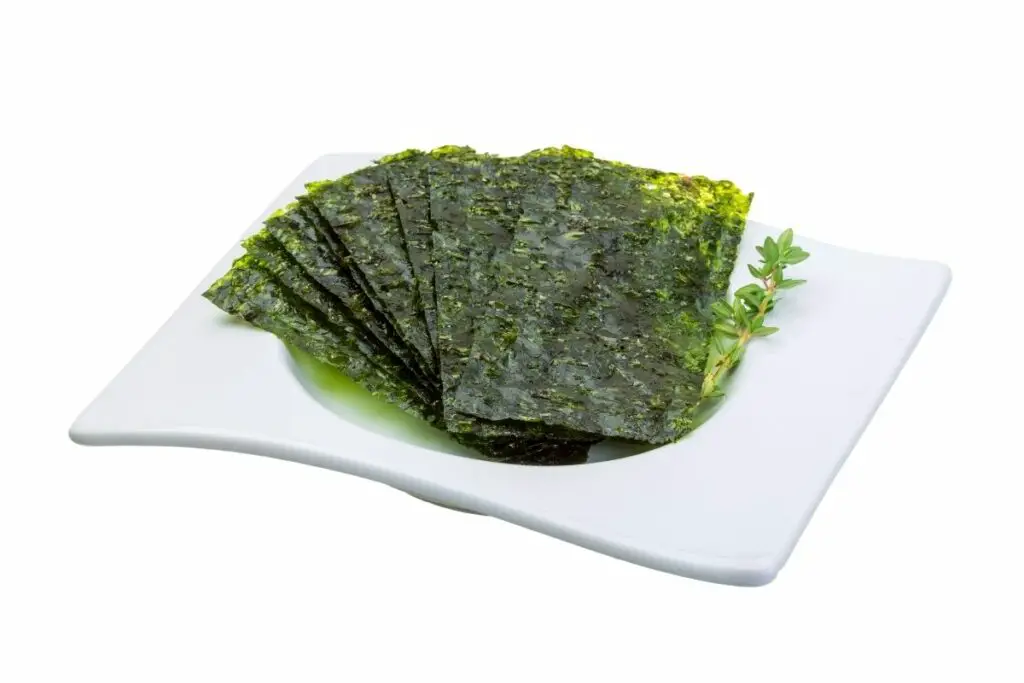In this article, we’ll look at what Nori is, where it originates from, and what makes it so unique in Japanese cuisine. Continue reading to find out.
What Is Nori?

Nori is the Japanese phrase for edible seaweed, although it is now recognized around the globe as a dried 7-inch by 8-inch sheet of processed nutritious red algae which is marine vegetation that grows on rocks in the shallow cold-water sea.
Nori has been a popular meal in Japan (see also, ‘What is the Most Popular Meal for Christmas in Japan?‘) from ancient times, dating back to when it was in the form of a paste. This paste, which is frequently highly salty, is used as a topping for rice or as a medicinal dressing.
Sheet Nori manufacturing was first created during the 18th century and has since taken over to become the roasted dark crispy thin layer that the world has come to know.
The procedure of creating sheet nori was identical to that of papermaking. In other words, red algae is shredded to a paste-like consistency and mixed with water.
This pulp is then uniformly distributed on a rectangular bamboo rack surrounded by a four-sided wooden frame. They are packaged in a dark green to jet black color after drying and occasionally toasting to send all over the world.
What Does Nori Taste Like?
If you’ve never had sushi before, or if you have and are curious about what percentage of the flavor is made up of Nori, you’re definitely curious about what Nori tastes like.
Nori’s flavor is not overwhelming, which is why it is so extensively used in sushi and other Japanese dishes.
Nori has a single dominant flavor which is salt. Nori isn’t salted before being used in cooking, and the flavor isn’t fake. Instead, because it is gathered from the sea, Nori has a naturally salty flavor.
Because the sea is salty, most seafood and seafood-derived foods taste salty.
But it’s not the flavor of Nori that stands out. Instead, it’s the constancy. Because Nori is a form of seaweed, it has a rough texture, and it tastes weird at first. This, however, is something you will rapidly grow used to.
How Is Nori Served And Eaten?

You can eat or serve nori in a lot of different ways with the most common way to serve nori is to wrap a nori sheet around a rice ball known as onigiri, or a hand cone roll which is a temaki or a sushi rice roll called makizushi.
However, because nori absorbs moisture from rice and may turn soggy, either roll as you eat or serve straight away to preserve all the freshness.
Another common application for nori is as a rice flavor, topping, or garnish. After roasting, the nori sheet is cut/shredded into little pieces and mixed with sesame, salt, and another dry vegetable/fish flakes.
This type of topping (furikake) is frequently provided in a zippered pouch or sprinkle container to create and serve flavorful quick meals.
To make snacks, cut nori into bite-size rectangles and season with olive oil. These snacks are available in most supermarket shops that have international aisles.
However, keep an eye out for the additional components, since many of them are either very salty or oily with a “long” greasy odor. To boost yourself with some nice snacks, go for ones that are original, organic, and from a reputable source with the fewest additives.
Chefs at certain places crush nori into little bits and use their secret formula to make a sauce out of it. Because nori is a natural umami element, it may be used in any recipe that calls for dashi/umami seasoning.
Is Nori Healthy?
First and foremost, Nori is a vegetable, which means it is high in antioxidants, vitamins, and other nutrients. Nori contains about 40 vitamins and minerals, including phosphorus, iron, calcium, niacin, folic acid, and cobalamin.
Numerous studies on nori have been undertaken, all of which indicate nori’s efficacy in helping to reduce cardiac difficulties, cholesterol levels, stress, and so on.
One sheet of nori provides the same amount of omega-3 fatty acids as two entire avocados. As a result, the quantity of DHA and EPA found in nori can be particularly beneficial, especially for vegetarians who cannot get fish oil.
Nori has more protein than an egg and ten times the calcium of milk in terms of percent equivalent.
Because it is fat-free and low in carbohydrates, nori is a superior snack for many diets. Every sheet of nori has one gram of fiber and one gram of protein while containing zero fat, zero carbohydrates, and less than one calorie.
So, if you’re managing your weight, a complete package to graze off during break would not be an issue.
Nori is an excellent source of iodine, which may be used to replace salt in your diet. If you don’t already know, iodine aids metabolism, which converts food into energy, and protects against radiation.
Nori, like many vegetables, is high in vitamin C, carotenoids, flavonoids, and other phytonutrients with antioxidant characteristics that help fight aging and defend against free radicals.
Along with fiber, Nori contains chlorophyll – the green pigment found in plants that is an incredibly effective and natural detoxifier that aids in the elimination of waste items from our bodies.
Nori contains vitamin A, which can aid with eye health, and magnesium, which helps with blood sugar regulation.
While Nori is associated with several health advantages, it is also associated with a number of significant negatives.
Nori is extremely beneficial to your health, but because it originates from the sea, there are certain health hazards linked with it. Let’s find out what they are.
One of the most significant disadvantages of Nori is that it is susceptible to contamination when exposed to seawater. The water is rich in various compounds and minerals, and many metals have been discovered there.
As a result, Nori is frequently polluted with hazardous elements like cadmium and arsenic. It is important to note, however, that this is only a danger; not all Nori is infected with these toxins.
Summary
There we have it, Nori is one of the most popular elements of Japanese cuisine, primarily sushi. It can be eaten and served in a lot of different ways with each one being delicious and healthy.
Nori is packed with lots of different health benefits, and because of this, it is good to add it to just about any diet, especially if you’re making vegan-friendly sushi.









